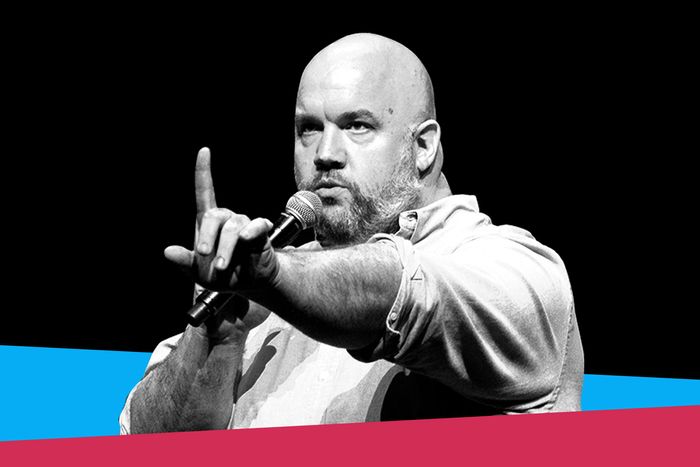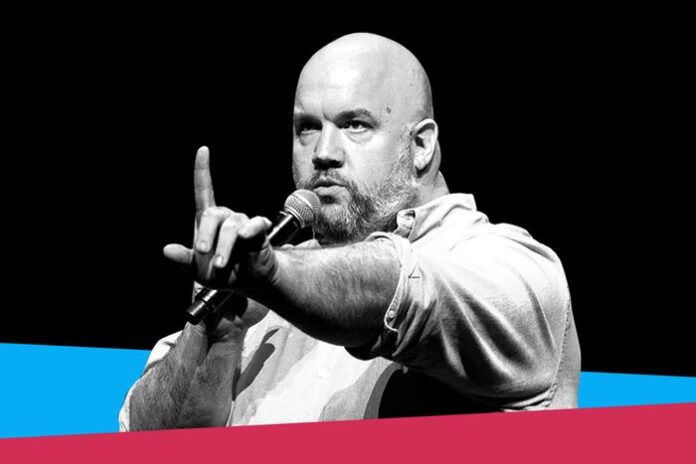
Photo-Illustration: Vulture; Photo by Rick Kern/Getty Images
Bros, the new film starring and co-written by Billy Eichner, is out this week, and in many ways it’s a pretty traditional rom-com. Judd Apatow produced it, and his longtime collaborator Nicholas Stoller directed it. Two love interests meet. They are opposites and yet they attract. But as you might have heard, what makes this rom-com different from nearly every one that has come before it is that it’s very gay. The leads are two men who have very gay sex in this film, including foursomes and wrestle play. As Eichner has mentioned once or twice, this is groundbreaking for a mainstream-studio rom-com.
Bros is getting a big theatrical release from Universal. It’s going to movie theaters exclusively before streaming, and it was given a healthy marketing budget. This week on Into It, host Sam Sanders spoke with comedian and writer Guy Branum, who stars in the film and co-produced it, about the discourse around Bros and the pressure on the film to both make money in theaters and represent the queer community, whatever that actually means. You can read an excerpt of their conversation below and check out the full episode wherever you get podcasts.
Subscribe on:
Your character in this movie is pushing against some of the tropes that traditional straight rom-coms fall into. But it’s also pushing against some of the tropes that gay cinema can fall into.
They cast me, an extremely fat gay guy, to play somebody who has a social life, and is out all the time, and knows everybody, and has sex, and has a good time. I was really surprised by that. I love and respect Billy, but I was still surprised that he thought of me for this role.
So they picked you for this?
Yes. The role is based on his best friend, who is somebody who is happy not being in a relationship. Billy wanted that energy there because the romantic comedy, as it exists, is heteronormative. It ends in an idea of two people being together, the prospect of a baby, the prospect of happily ever after. And one of the things that this movie tries to deal with is the fact that happily ever after can look different for queer people.
A lot of the time, when there is a gay man onscreen who is not stereotypically skinny and white-guy hot, he is depressed, traumatized, unfulfilled. But you play this character who is not depressed because of his body or anything else. When you were channeling that role, how much of it was you pushing against straight tropes like rom-coms? And how much of it was you also pushing against some of the way queer cinema and TV depicts people like you?
Just getting to be there was pushing against the tropes of gay cinema. So frequently we have this very restrictive idea of who gay people are, even though that’s not the life that we lead; it’s not the world that we are in. There is this idea of all gay men must be white, rich, and very conventionally attractive or else they must be terribly sad. There is this Velvet Rage, The Best Little Boy in the World idea that we have to be constantly, visually, visibly proving that we are okay so that we do not fall into straight people’s tropes of terrible, sad gay guy that we see in a thousand movies being played by a thousand straight guys. And when a character who looks like me shows up in any movie, they’re usually there to be the butt of a joke.
And to live out trauma.
To live out trauma and also to displace trauma. It is to take all of the things that people fear about themselves and put it on an other so that they can imagine themselves to be the handsome people at the heart of the story. The character gave me space to do something that was at odds with that — to just have fun with this role that, in straight rom-coms, is so much fun. I have been the sassy gay friend in a romantic comedy before. From Rosie O’Donnell to Eve Arden, the sassy-wiseacre friend in a romantic comedy is a well-respected role that queer people love. So much of the time, it is a sad-sack fat friend, but this movie didn’t feel the need to place the onus of sad-sackness upon me. And I was really pleased with that.
I also love that this movie accepted that all kinds of gay men have a good amount of sex. All sizes and shapes of gay men have sex. So much of queer TV and cinema denies this, but Bros admits that even outside of the CrossFit gays, we still fuck.
One of the dangers that comes along with the passing privilege of being a cis gay guy is this obligation to pass, to disappear into straight people (who are not really thinking that much about you) and this fear that being honest about our lives will horrify straight people. When you look to so much more mainstream art about gay men, it always feels this need to apologize and say that their main character isn’t like those other gays: We want monogamy. We want love. We don’t have a whole bunch of sex. And there’s this other, different gay guy who’s having too much sex — and we’re scandalized by it. We think it’s fun, but the story feels the need to punish him. And that this is a movie where people have sex for fun, where people do poppers to help with sex. I just read the Catholic Review’s take on this movie —
Why would you punish yourself like that, sir?
Because it’s fascinating and beautiful that the Catholic Review is reviewing this movie. There’s something nice about the Catholic Review feeling the need to say it’s funny, but there are so many people who just don’t think that representations of our lives as being normal and functional should exist.
There’s been a lot of discourse around this film — and a discourse around that discourse. Billy Eichner has said that he’s felt this responsibility for the movie to do well so other queer stories get green-lit. How much of that pressure did you allow to get in your head?
Are you familiar with the concept of shanda fur die goyim? It’s a Yiddish phrase, and it basically means “You’re embarrassing us in front of the Gentiles.” With this movie, there was a sense of wanting to represent your group responsibly. There’s also just this commercial element that is really hard because it is just this question of, Can we be trusted with the resources that make mainstream entertainment possible? Trying to run that line is going to inherently involve compromises.
What was the biggest compromise you saw in making this film?
A lot of people have questioned why the movie is about two white cis gay guys who are pretty conventionally attractive — in Luke Macfarlane’s case, very conventionally attractive; in Billy’s case, okay. But I think there is a sense of trying to give people something that they will understand, a version of queerness that is still involving a pretty, uh, I don’t know how to say this …
You can say it!
A vision of queerness that they maybe have seen before.
And a vision of queerness that they maybe can put themselves on top of, put themselves in.
Right.
In the heyday of rom-coms in the ’90s, those got to just be straight and white and pretty — Julia Roberts got to be Julia Roberts. Do you get angry sometimes at the pressure queer content has right now to be understandable enough for straight audiences while also having enough inside jokes for queer audiences while also doing well at the box office?
Yes, and there’s no way around that. In “A Room of One’s Own,” Virginia Woolf talks about how she’s basically comparing Jane Austen and Charlotte Brontë, and she’s like, “Charlotte Brontë is a greater genius, but her work is undercut by flashes of rage at a fundamentally misogynistic world.” (Something along those lines; I haven’t read it since college.) And while watching Bros, I was very aware that there are flashes of rage that come out, and that rage is honest. And there is something terrible and beautiful about the fact that we are having to navigate oppression at the same time as navigating just finding someone you want to spend your time with.
A lot of people have had questions about Bros being produced by Judd Apatow and directed and co-written by Nicholas Stoller, both of whom are straight guys. I thought it was a really beautiful and wonderful process because it was straight white cis guys who were actually listening, which is something you don’t always get. Having those people listen to and participate in these frustrations and that rage, having them wrap their heads around it over the course of years, was really a beautiful process — one that ended up in a really fun, mainstream movie that is also authentic and real and honest.
How different would this film have been if all the folks at the top of it were queer?
I mean, it would’ve been wonderful. There have been so many movies that were made outside of the studio system by largely or entirely queer filmmakers that are magnificent. But there is a fear when you are doing something for the first time that you’re doing it wrong. There is the fear that comes when you have been systematically excluded — that you don’t have what it takes — and having Judd Apatow and Nick Stoller say, “You’re good; this film is funny,” was really helpful. Also, having them listen when they wanted to go in one direction and Billy was resolute that it was not the right answer was really important. It makes for a funnier movie when you create space for people to be open and feel trusted and supported.
What criticism have you found most annoying and disingenuous so far?
To me, the thing that is most annoying is the idea that you directly need to pit this up against some other queer movie —
Fire Island. There’s already been that comparison.
Yes. The notion that there can only be one gay movie that is the true and correct gay movie, and that somehow it is a referendum on your identity as a queer person, is ridiculous. We got two big-budget gay romantic comedies this year. It’s exciting. Bros and Universal have been really intent on talking about what a historic thing they’re doing. But in doing that, they aren’t leaving space for acknowledging the fact that we come as part of a tradition of studio gay rom-coms. There’s Billy’s Hollywood Screen Kiss. There’s Trick. Those filmmakers didn’t have the kind of support and didn’t have the kind of marketing or release that Bros is going to enjoy.
It’s all very annoying, but also it’s 100 percent unavoidable. We’re showing up to the party in a bigger way than we have been able to in the past, and there’s going to be some anxiety around that — there’s no way around it. You cannot change the problems of millennia of marginalization without things being a little bit weird around it, and it’s going to be part of the game. But all of this discourse isn’t going to change the fact that five years from now, ten years from now, 20 years from now, young queer people are going to be able to go to their streaming service and watch a beautiful, lush, hilarious movie about going on a queer vacation for a week with the people you love most, a splashy, fun romantic comedy in the fashion of, like, a Nora Ephron movie about two guys who don’t really understand relationships trying to have a relationship. A year from now, this discourse won’t matter. What will matter is the art that was made.
This interview has been edited and condensed.
Even though the Catholic Review rated Bros “U — unsuitable for all,” critic John Mulderig writes that “some of the screenplay’s humor works.”








